By providing your information, you agree to our Terms of Use and our Privacy Policy. We use vendors that may also process your information to help provide our services. This site is protected by reCAPTCHA Enterprise and the Google Privacy Policy and Terms of Service apply.
‘Orphan Black’ Co-Creator Graeme Manson Talks Nature Vs. Nurture and Cronenberg Influences In His Clone Drama

“Orphan Black” was television’s sleeper hit of 2013. BBC America‘s just barely sci-fi drama won over audiences and journalists with its fleet, twisty storytelling and wry sense of humor, anchored by a virtuoso set of performances by Golden Globe nominee Tatiana Maslany, who plays a set of identical clones with very different personalities and upbringings, from an uptight soccer mom to a biology grad student to a psychotic assassin.
Produced in Canada, where it airs on the Space channel, “Orphan Black” has presented a rich mythology that includes religious (Prolethians) and scientific (Neolutionists) factions trying to destroy or control the clones, among them the scrappy Sarah Manning, the show’s punky main character — but it has never let its conspiracies get in the way of its sense of fun. With season two of the series set to premiere on April 19th, Indiewire sat down with Graeme Manson (“Cube”), who co-created the series with fellow showrunner John Fawcett (“Ginger Snaps”), to talk about what’s next for Sarah and her genetically identical cohorts.

With the show becoming such a critical and fan hit in its first season, is there more pressure for you now, knowing that you have all these people on board right away going into the second season?
A little, but John Fawcett, my creative partner, and I, we put a lot of pressure on each other to raise the bar, episode to episode, season to season. We put enough pressure on ourselves.
It’s really juicy for us to go, we’ve got to have more people watching the show, getting to see what happens — how do we mess with their minds? How can we keep it as surprising as the first season? Which has been the driving goal for the second season. And I think it is. By the end of the second, nobody’s going to say we didn’t go for it.
The whole concept of “Orphan Black” rests on having a performer that not only can play multiple characters and keep them all defined enough that you buy into them being different individuals, but who can play characters pretending to be other characters in a way that we can recognize. That must have been a gamble, in terms of counting on finding a lead who could handle that.
It was a gamble — in getting the show made and pitching the show. “It’s a great premise, maybe you guys should write a novel.” Because that’s it, if you don’t hit it with the performer, then the show doesn’t work — period. So we’re very very lucky to have found Tat, who’s someone that we had worked with before.
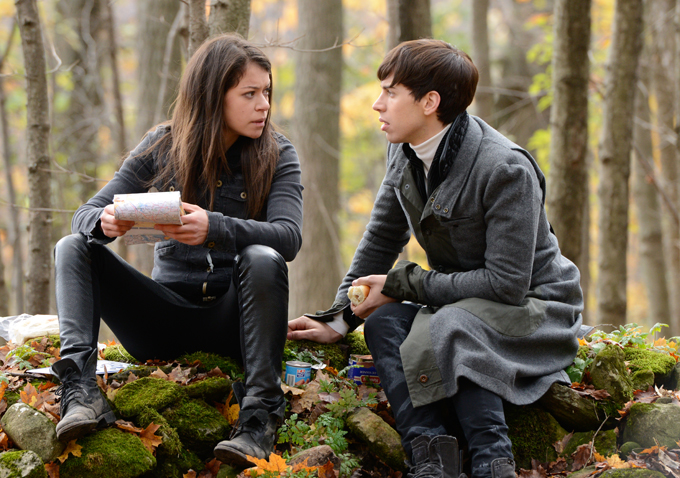
She’s amazing.
Yeah. Those characters — she’s very well prepared. she does a lot of thinking and work to get them delineated like that. And you know, when we started writing the one character impersonating another, it was not an idea we had at the beginning. Just because doppelgängers, twins do that switcher stuff. It’s risky.
You’ve mentioned not knowing how many clones there are, but that you know where this story will end. How much of a bible did you write before going into it in the beginning?
A pretty extensive bible, but with a loose forward throw — “And then we’re in season two and then we’re in season three and we could do this and blah blah until season 5.” It’s really a demonstration that the premise is perpetual, which they want to hear in TV — they want to hear that it’s not going to cycle itself out after a season. We’d done a lot of that work in terms of the big picture stuff, the conspiracy. We’re huge fans of “The X-Files.” Those guys did it right.
There are times in the writers’ room where we may feel for a while that we don’t really know where we’re going or the connections are getting too tenuous, but then we always lock it down. You have to trust in that.
The first season raised so many questions — about how Alison got her monitor, about the disease some of the clones have, about these two opposing forces. How do you know what the right rate is to leak out answers, and raise more questions without making people frustrated?
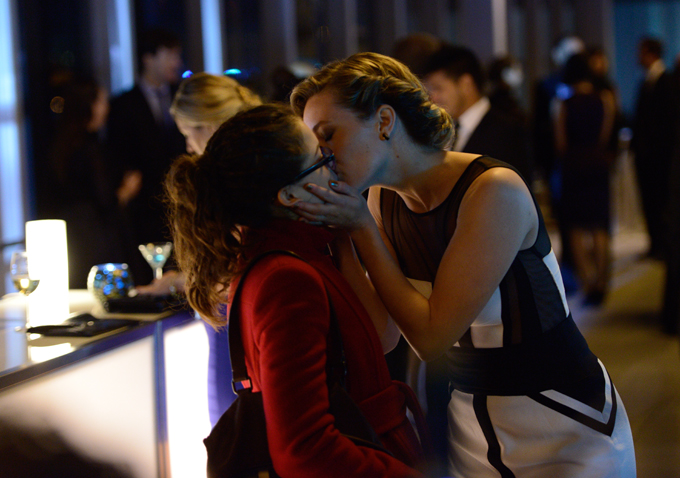
You have to give answers. You have to give satisfying answers to some of these questions — that’s really the hardest work that we had in the writers’ room, how to answer a question and then open a door to more. There’s no easy way to do it. It’s hard work.
It’s what do you say and what do you not say. If we don’t touch that issue this week, will it feel like we dropped a ball? Does the slight of hand keep the eye on the other stories? Those kinds of things are very tricky with this show.
One of the questions the show raises is that of nature versus nurture. It does seem to fall pretty heavily on the side of nurture in terms of how different all the clones are, from things like how responsible they are to their interests to their sexuality. Is that part of the overall philosophy of the show?
I don’t know, i think their similarities are very interesting too. The physical similarity is the least interesting part about clones, to me. How they are different is the most interesting part — and how they want to be seen as different from each other. What happens to your self-perception and your sense of identity has always been a theme of the show.
But, I’m also interested in things like — they’ve got this inherent bravery. They all do things rather rashly, they all have blind spots. And then they may all be facing the same biological problems that Cosima is. But dramatically, their differences are more interesting, in terms of storytelling. It’s just better to focus on their differences than how similar they are, or else you end up with clone drones in stasis tubes. I’m not interested in that. You’ll never walk into a room and find 100 clones in stasis tubes. I guarantee that will not happen.
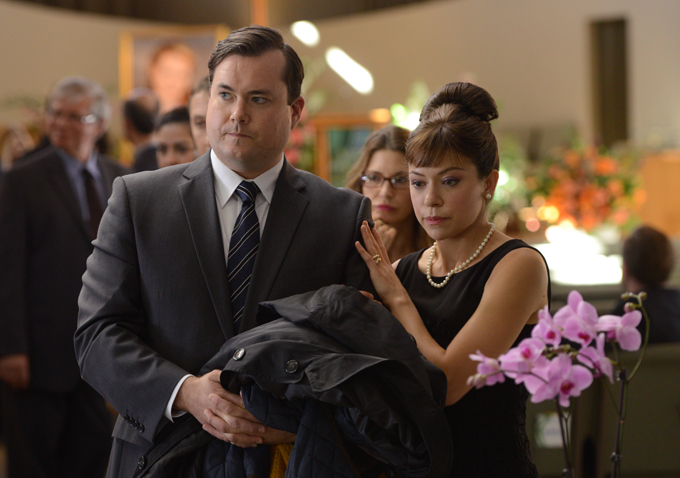
One of the other things that the series has touched on is the idea of whether, if you’re a clone, you’re fully human — especially with the revelation that the clones are patented creations.
Yes, we explore that a little more, although we don’t want to dwell on it too much. It’s a running issue as to what those patents really mean. It’s part of the mystery. And contemporarily, the Supreme Court decision on patents, there’s a mystery there too about what constitutes “synthetic.” If you inserted a synthetic sequence in a natural plant, or, say, you’re Monsanto, “Oh, I own that plant.” Do you? The legal ramifications have yet to be fleshed out and tested.
The show is shot and set in Toronto, though that’s not mentioned. Is that to make it more accessible in the U.S.?
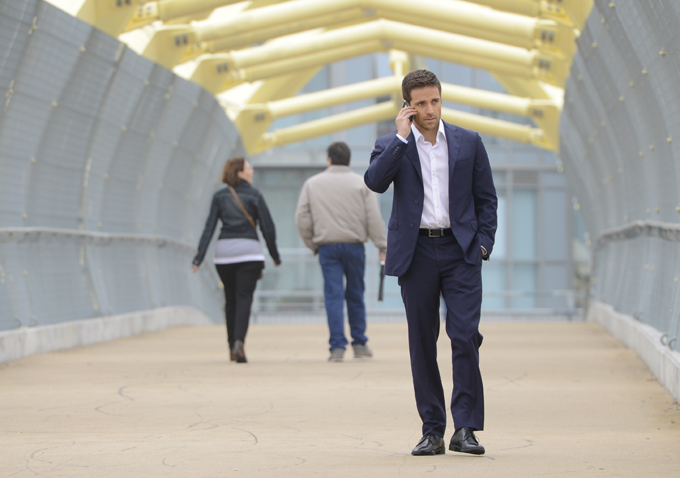
It’s a practical thing that occurs when you do a co-production with networks that have different desires for not wanting it to be too this or too that. It’s not my favorite part. I would like to be more specific, honestly. What we’ve ended up with is this “it could be anywhere.” It fits the show as well, that it exists in its own little world. That’s what i do like about it.
As a fan of “Cube” and John Fawcett’s “Ginger Snaps,” I’m curious if you feel there’s a different personality to Canadian genre fare.
Well, we’re all children of David Cronenberg — maybe that’s it. We all have Cronenberg DNA. I don’t know what that is but we do do our genre stuff well. I think that the Canadian sense of humor marks it as well. That’s a national trait.
Do you see Cronenberg influences in “Orphan Black”?
Absolutely. Take the tail! And body horror in general. I think it’s definitely territory that Cronenberg explored.
That Neolution side of things, were you looking at transhumanism when you came up with that?
Yeah, or those philosophies of self-corrective evolution, extreme body mod type things. I find that stuff really interesting and relevant and contemporary — and very human.
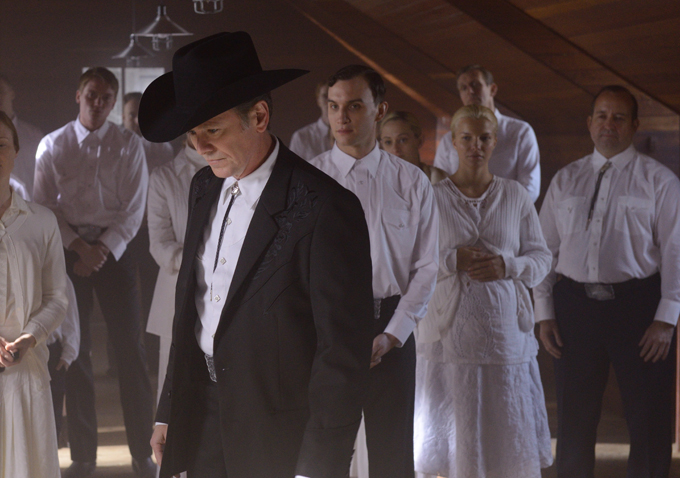
To me, it’s logical that that’s where we go with our technology. That we apply it to ourselves. I don’t find it shocking. I think we won’t be able to help ourselves from trying to affect evolution and our own evolution in our own short lifespans. It’s only a matter of time. It’s happening.
Is there any one theme that you’d say guides the new season?
I would say… that we are stronger together.
By providing your information, you agree to our Terms of Use and our Privacy Policy. We use vendors that may also process your information to help provide our services. This site is protected by reCAPTCHA Enterprise and the Google Privacy Policy and Terms of Service apply.

















